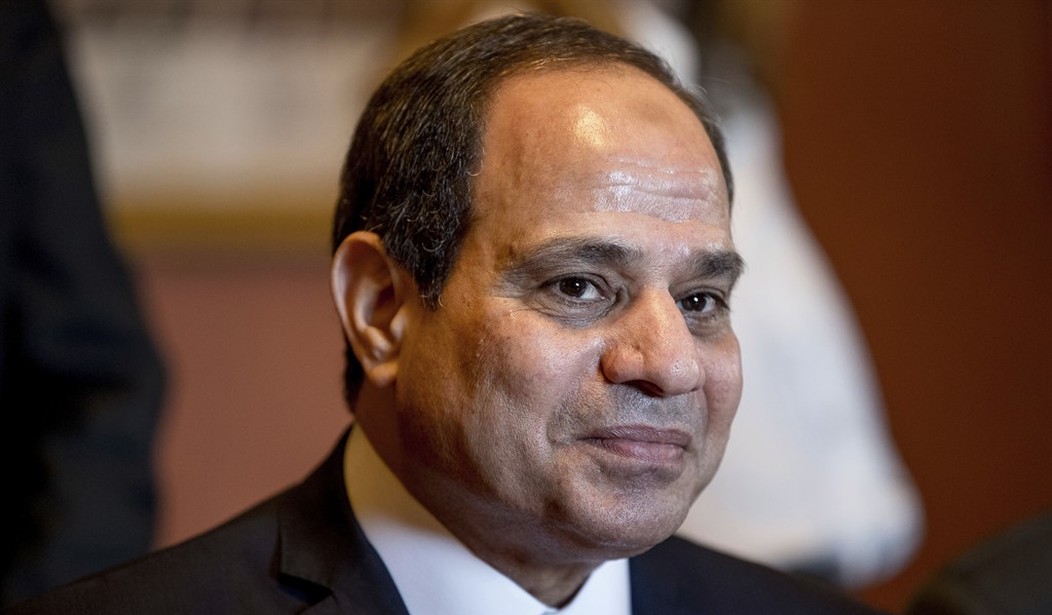The Abraham Accords still live! At least that’s the first takeaway from this splashy announcement out of Jerusalem. Naftali Bennett will be the first Israeli prime minister to make an official state visit in a decade, part of an attempt by Abdel Fattah al-Sisi to cool down tensions over Gaza.
Bet on this being received in Gaza as something slightly different than assistance:
Egypt’s president invited Israeli Prime Minister Naftali Bennett on Wednesday for an official visit in the next few weeks, a statement issued by Bennett’s office said.
“The invitation from President Abdel Fattah al-Sisi was conveyed by Egypt’s intelligence minister during a meeting with Bennett in Jerusalem,” the statement said.
That’s actually quite a statement of confidence in Israel, especially given the body blow to American prestige Biden has delivered in Afghanistan. Just yesterday, the Times of Israel wondered whether their own national security would suffer after the humiliation the US has suffered in Kabul at the hands of radical Islamists. Israel has little choice but to stick by the US, but at least might have more leverage in the short run in that relationship:
“When the US is seen as weak, in the simplest terms, it’s bad for Israel,” said Micky Aharonson, a senior fellow at the Jerusalem Institute for Strategy and Security and former foreign policy director at Israel’s National Security Council.
The idea that the most capable intelligence apparatus in the world so badly misread a country it has been intimately involved with for two decades does not inspire confidence in America’s abilities to read and shape the region — especially after a string of high-profile intelligence failures in Iraq, Iran, Libya and more.
“Whenever the world’s most powerful nation suffers a humiliating foreign policy failure, it’s going to have far-reaching international effects, including for countries, like Israel, who have based so much of their own deterrence and national security on the credibility of their strategic partnership with the United States,” said John Hannah, senior fellow at the Jewish Institute for National Security of America.
“Even if Israel isn’t directly threatened, many of its weaker neighbors in the Arab Gulf and elsewhere might be, to the detriment of Israel’s own security situation,” he warned.
That’s what makes the invite from al-Sisi so interesting. He faces significant pressure from Islamists to, mainly from the Muslim Brotherhood but also from their offshoot Hamas as well as other regional terror networks. The fall of the US in Afghanistan will embolden those groups to go after secular dictatorships like al-Sisi’s, and also those in other Sunni countries with which Israel has normalized relations. An invite to Bennett is practically a dare to these Islamists, who see Israel in much the same terms as the Shi’ite Islamists in Tehran — as a key target in their war on the infidels.
Of course, al-Sisi hopes to get Israel to cooperate in Gaza to relieve political pressure over the enclave. Egypt has partnered on security there, enforcing a blockade (at least ostensibly) to prevent Hamas and Islamic Jihad from getting too many weapons and starting mischief. But al-Sisi could get that cooperation without the courtesy of a state visit from the Israeli PM, and has for the past decade.
So clearly al-Sisi wants to send some sort of signal. Perhaps he sees this as a good time to shore up the Israel-Sunni alliance against Iran as Afghanistan collapses into radical Islamism again. Maybe he wants to cut out the American middle-men in this effort and take the lead on pursuing the Abraham Accords, which would boost his own standing among the anti-Tehran alliance even as it puts him at more risks from the radical Islamists. Either way, it’s a welcome development, especially given the next three years of utter incompetence we can expect from Washington on this front.








Join the conversation as a VIP Member